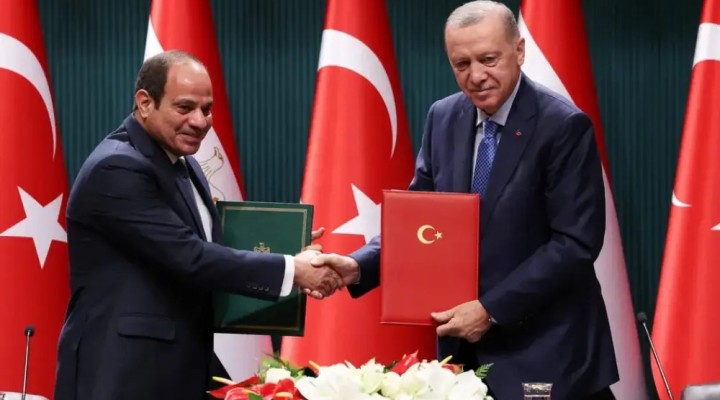Turkey And Egypt To Move From Enmity To Friendship

The cooperation between the two countries may affect the region of North Africa and the Middle East.
On September 4, 2024, Egyptian President Abdel Fattah al-Sisi visited Ankara and met with Turkish President Recep Tayyip Erdogan. This was the first visit by an Egyptian president in the last 12 years. Although the focus was on the discussion of Gaza and the need to coordinate actions against Israel, the ministers of the two countries also signed 18 memorandums of understanding on cooperation in energy, defense, tourism, health, agriculture, finance, culture, education and transport. Speaking at a joint press conference, Erdogan reiterated that Turkey and Egypt wanted to boost annual trade by $5 billion to $15 billion in the next five years. For his part, Sisi said they also discussed the situation in Libya, over which the two countries have long been at odds and backed opposing factions in an unresolved conflict.
Earlier, in February 2024, Erdogan was in Cairo, and then relations were formally normalized. Bilateral relations between the two countries deteriorated significantly after the overthrow of President Mohamed Mursi in the June 30, 2013 revolution, as he was a close ally of Turkey, which supported the Muslim Brotherhood (banned in Russia). The Turkish media (as well as local and visiting “brothers” who were given access to information platforms) began to criticize Sisi, and Erdogan repeatedly mentioned his name in political rhetoric, drawing parallels between Sisi and some opposition figures in Turkey to gain support, especially before the elections.
The current pivotal shift in relations derives from various economic and strategic interests, which are influenced by the geopolitical conjuncture of the region.
If we talk about the economy, Turkey and Egypt are interested in its recovery. Turkey continues to experience severe inflation and devaluation of the Turkish lira, while Egypt is among the first ranks of the IMF’s main debtors.
Both countries will have to adjust their foreign policy. In particular, on Libya, where Turkey supported the Government of National Accord in Tripoli (because of its ideological proximity to the Muslim Brotherhood), and Egypt supported the Libyan National Army of General Khalifa Haftar. Russia also supported Haftar in order to prevent the strengthening of the influence of Islamist forces in the region. In this, the goals of Moscow and Cairo coincided.
Energy also plays an important role, as Turkey is interested in becoming a regional hub, using the capabilities of neighboring supplier countries from Azerbaijan and Russia to Iraq. And the import of liquefied natural gas from Egypt could give Turkey additional opportunities, including for transporting gas to Europe. In February, the Turkish Petroleum Pipeline Corporation (BOTAS) and the Egyptian Natural Gas Holding Company (EGAS) agreed to enhance cooperation on trade in natural gas and LNG.
Energy security is linked in a certain way to interests in the Southern Mediterranean, where Turkey has a long-standing conflict of interests with Greece, Cyprus and Israel. Not so long ago, Turkey was also excluded from the Eastern Mediterranean Gas Forum, established in 2020. Therefore, through Egypt, Ankara will try to influence this agenda or, at least, smooth out contradictions with Egypt alone.
And since Egypt is also a member of the BRICS, it can lobby Turkey’s interests in this club. It is no coincidence that this year Turkey began to actively declare its interest in becoming a member of this organization.
The interests of Turkey to expand the export of its military products should also be noted. It is known that Turkey had previously agreed to export its armed drones and other military equipment to Egypt.
The two countries have interests in the region, in particular, in the Horn of Africa. Egypt is making claims against Ethiopia (which is also a member of BRICS), which started the construction of a huge dam on the Nile. The United Arab Emirates is actively investing in this construction. In addition, in January of this year, Ethiopia signed a historic agreement with Somaliland, which, despite the lack of international recognition, granted Ethiopia access to the Red Sea in exchange for recognition of Somaliland’s sovereignty.
Thus, Ethiopia is trying to diversify access to maritime communications. On the other hand, Egypt has signed a military agreement with Somalia, which Ethiopia sees as a challenge to its maritime agreement with Somaliland. Meanwhile Turkey has stepped up its efforts to mediate negotiations between Somalia and Ethiopia, seeking to strengthen its diplomatic influence as a mediator in the region. Significantly, Turkey is also selling its armed drones to Ethiopia.
Add to this the ongoing military conflict in Sudan, which borders Egypt. Of course, the neighboring Gaza Strip now occupies a higher priority position and for the delivery of humanitarian aid (including from Turkey), the territory of Egypt is the most optimal.
Altogether, quite interesting combinations are being set up, in which other actors of the region also take part. At least, there are attempts of influence from Saudi Arabia, but also from Western countries. Russia, being a partner of both Egypt and Turkey, is more distanced from regional processes. At the same time, strengthening relations, especially if they have a clear effect on ending Turkey’s support for the Muslim Brotherhood, would be beneficial for regional security from Russia’s point of view.
In the long view, of course, any process of de-westernization would be welcomed by Moscow. Although the efforts for cooperation between Turkey and Egypt, which are just beginning to gain momentum, must stand the test of time. Yet, it is necessary to take into account the factors of historical memory, since Egypt had been under the control of the Ottoman Empire for a long time, and the current schools of Islam of the two countries continue to differ from each other. And competition in the tourism sector also remains by no means unimportant factor that has a significant impact on the economies of the two countries.
https://orientalreview.su/2024/09/26/turkey-and-egypt-to-move-from-enmity-to-friendship/
 TheAltWorld
TheAltWorld 
0 thoughts on “Turkey And Egypt To Move From Enmity To Friendship”